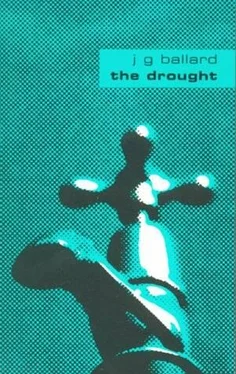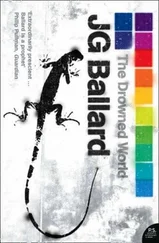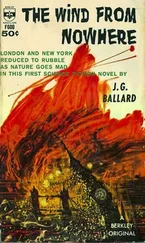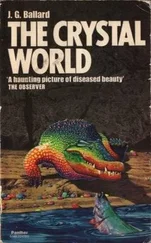The other man, a trilby pulled down to shade his face, eyed Ransom curiously. He seemed to detect the lack of conviction in Ransom's voice, and gave him a thin smile, almost of encouragement, as if Ransom had successfully passed this first hurdle.
Ransom walked back to the car. The road wound down the side of the cliff, past the people who had retreated to this last vantage point. It leveled out and approached the first of the shanty camps.
Immediately all sense of the sea was lost, the distant dunes hidden from sight by the roofs of trucks and trailers, and by the drifting smoke of garbage fires. Thousands of people squatted among the cars or sat on their doorsteps. Small groups of men moved about silenfly. The road divided, one section running parallel with the beach along the foot of the hills, the other heading diagonally toward the sea. Ransom stopped at the junction and searched for any signs of police or an army control post. On their right, smashed to pieces at the roadside, were the remains of a large sign, the metal scaffolding stripped of its wooden panels.
Choosing the beachward road, Ransom entered the shanty town. Twenty yards ahead was a crude barricade. As they stopped, four or five men appeared from the doorways of the trailers. They waved at Ransom, gesturing him back. One of them carried a metal fencing post. He walked up to the car and banged it against the grille.
Ransom held his ground. Ahead the road disappeared within fifty yards into the jungle of shacks and cars. The ground was churned into huge ruts.
A dirty hand spread across the windshield. A man's unshaven face poked through the window like a muzzle. "Come on, mister! Back the hell out of here!"
Ransom started to argue, but then gave up and reversed back to the road junction. They set off along the coast road below the cliffs. The huge motorcamps stretched ahead of them to the right, the backs of trailers jutting out over the empty sidewalk. On the left, where the cliffs had been cut back at intervals to provide small lay-bys, single families squatted under makeshift awnings, out of sight of sea and sky, gazing with drained eyes at the shack camps separating them from the beach.
Half a mile ahead they climbed a small rise, and could see the endless extent of the camps, reaching far into the haze beyond the cape ten miles away. Ransom stopped in a deserted filling station, peering down a narrow lane that ran into the trailer camp. Small children squatted with their mothers, watching the men stand and argue. The smoke of garbage fires drifted across the blank sky, and the air was touched by the sweet, acrid smells of unburied sewage.
A few dust-streaked cars cruised past in the opposite direction, faces pressed to the windows as their occupants searched for some foothold off the road.
Ransom pointed to the license plates. "Some of these people must have been driving along the coast for days." He opened the door. "There's probably little point in going on any further. I'll get out and have another look around."
He walked down the road, glancing between the lines of vehicles. People were lying about in the shade, or had walled in the narrow alleys with squares of canvas. Further in, a crowd of people surrounded a large chromium-sided trailer and began to rock it from side to side, drumming on the doors and windows with spades and pickax handles.
An old cigarette kiosk leaned against a concrete telegraph pole by the side of the road. Ransom managed to lift one foot on to the counter, then climbed up onto it. Far into the distance the silver roofs of the metal hangers along the shore glistened in the sunlight like some unattainable El Dorado. The sounds of pumping equipment drummed across to him, overlaid by the murmur and babble of the people in the camps.
Below Ransom, in a small niche off the edge of the sidewalk, a middle-aged man in shirtsleeves was working a primus stove below the awning of his trailer, a miniature vehicle little larger than a sedan chair. Sitting inside the doorway was his wife, a sedate roundfaced woman in a floral dress. The primus flared in the heat, warming a metal teapot.
Ransom climbed down and approached the man. He had the intelligent, sensitive eyes of a watchmaker. As Ransom came up, he quietly poured the tea into two cups on a tray.
"Herbert," his wife called warningly.
"It's all right, dear."
Ransom bent down beside him, nodding to the woman. "Do you mind if I talk to you?"
"Go ahead," the man said. "But I've no water to spare."
"That's all right. I've just arrived with some friends," Ransom said. "We intended to reach the beach, but it looks as if we're too late."
The man nodded thoughtfully. "You probably are," he agreed. "Still, I wouldn't worry, we're not much better off." He added: "We've been here two days."
"We were on the road three," his wife interjected. "Tell him about that, Herbert."
"He's been on the road too, dear."
"What chance is there of getting onto the shore?" Ransom asked. "We're going to need some water soon. Aren't there any police around?"
"Let me explain." The man finished sipping his tea. "Perhaps you couldn't see from up there, but all along the beach there's a double wire fence. The army and police are behind there. Every day they let a few people through. Inside those sheds there are some big distillation units; they say there'll be plenty of water soon and everyone should stay where they are." He smiled faintly. "Boiling and condensing water is a long job; you need cooling towers a hundred feet high."
"What happens if you climb through the wire onto the beach?"
"_If_ you climb through. The army are all right; but last night the militia units were shooting at the people trying to cross between the fences. Machine-gunned them down in the spotlights."
Ransom noticed Philip Jordan and Catherine standing on the sidewalk. From their faces he could see that they were frightened he might leave them when they were still a few hundred yards short of the beach.
"But what about the government evacuation plans?" he asked. "Those beach cards and so on…" He stood up when the other made no reply. "What do you plan to do?"
The man gazed evenly at Ransom. "Sit here and wait." He gestured around at the camp. "This won't last forever. It can't. Already most of these people have only a day's water left. Sooner or later they'll break out. My guess is that by the time they reach the water they'll be thinned out enough for Ethel and me to have all we want."
His wife nodded in agreement, sipping her tea.
They set off along the road again. Gradually the hills began to recede, the road turning until it moved almost directly inland. They reached the margins of the river estuary. The funnel-shaped area had once been bordered by marshes and sandflats, and the low-lying ground still seemed damp and gloomy, despite the hot sunlight breaking across the dry grass. The hundreds of vehicles parked among the dunes and hillocks had sunk up to their axles in the soft sand, their roofs tilting in all directions. Ransom stopped by the edge of the road, the presence of the riverbed offering him a fleeting security. Three hundred yards away were the stout fencing posts of the perimeter wire, the barbed coils staked to the ground between them. A narrow strip of dunes and drained creeks separated this line from the inner fence. A quarter of a mile beyond they could see a small section of the shore, the waves foaming peacefully on the washed sand. On either side of the empty channel dozens of huts were being erected, and bare-cheated men worked quickly in the sunlight. Their energy, and the close proximity of the water behind their backs, contrasted painfully with the thousands of listless people watching from the dunes on the other side of the barbed wire.
Ransom stepped from the car. "We'll try here. We're further from the shore, but there are fewer people. Perhaps they dislike the river for some reason."
Читать дальше
Конец ознакомительного отрывка
Купить книгу








